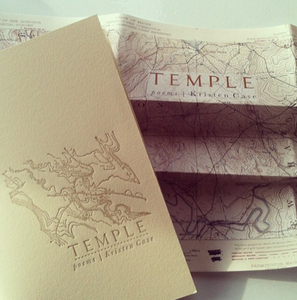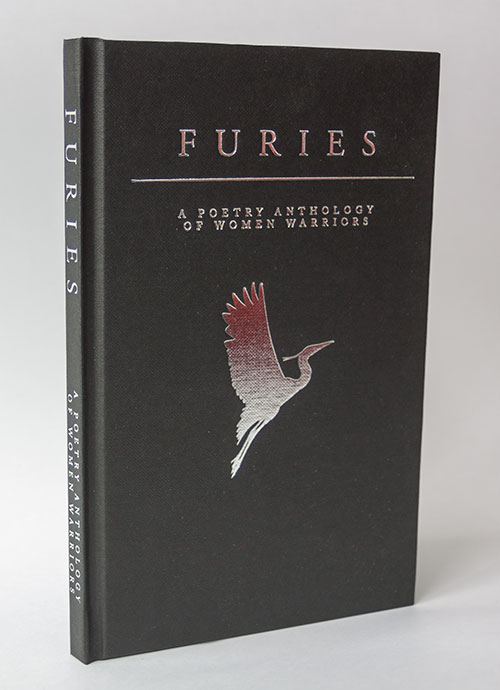‘The Patron Saint of Schoolgirls’ by Liz Berry
-Reviewed by Claire Trévien–
This review is late to the party, Liz Berry published the pamphlet The Patron Saint of Schoolgirls with Tall-Lighthouse two years ago after having won an Eric Gregory Award in 2009. She is now an Emerging Poet in Residence at Kingston University and a 2011 Arvon/Jerwood mentee with an impressive publishing record. Fortunately, these poems somehow feel timeless, and waiting this long to encounter them in their pamphlet form is not too dissimilar to waiting for a good wine to mature. It’s going to be a challenge to steer clear of food imagery when describing Berry’s poetry since her adept combination of craft, heart and musicality, creates poems that can only be described as moreish. They’re accessible on a first reading, and yet a part of them (which will always elude you) keeps you returning for more until it shades your life differently.
Take ‘The Year We Married Birds’, which is perhaps the most famous from the collection since it won second prize in the Torriano competition in 2010. It is quite possible to enjoy the poem on a surface level:
‘That year, with men turning thirty
still refusing to fly the nest,
we married birds instead.’
The language is clear and direct, and Berry’s persistence with this beautifully strange concept gives us humorous and light-hearted images of magpies smashing jewellers’ shop windows and restaurants serving worms. Yet, under this apparent cheer, there is the gleam of a kingfisher’s ‘metallic turquoise suit’ and the ‘fanning of his feathers / on my cheek’. Slowly, subtly, with each reading, the atmosphere turns chilly and one is left to wonder: what does this alliance really mean? Like a Daphné du Maurier short story, piercing the rationality behind the strangeness is secondary to enjoying the frisson of the unexplained.
This technique, to start with an idea and run wild with it is one that reoccurs throughout the pamphlet, in particular with ‘When I was a Boy’, and the title piece ‘The Patron Saint of Schoolgirls’. As with ‘The Year We Married Birds’, the reader is given a choice: to enjoy the lightly humorous first reading, or to persist as the smiles begin to freeze. There is a sense of play-acting throughout these narrative poems, of a child who has run loose with the dressing up box, but behind them is a knowing adult steel, and it is this powerful combination that makes the poems work.
On the opposite page to ‘The Year We Married Birds’, we have the extremely sensual ‘In the Steam Room’, where one can almost taste the sweat:
‘ nuzzling the neck
of the fat man
on the bench, easing
beneath the breasts
of the beautiful girl
in the dripping blue swimsuit,
every pore an invitation’
There is no childishness here, but the sheer delight in the way bodies are separate yet unified in this room by the opening of pores is a natural progression to the more ‘childish’ poems. Berry’s enthusiasm for life, in all its ordinariness: ‘every mouth, ear / nostril, arse hole, rich anemone seabed of cunt / a place for joy’ is infectious.
‘Homing’ is another highlight of the collection: a love poem to a girl’s Black Country accent. The accent has been kept for years ‘in a box beneath the bed, / the lock rusted shut by hours of elocution’. It is a poignant poem that speaks of the accent’s intrinsic relationship to the earth from which it comes. Berry’s descriptions are feral, textured and contagiously passionate: ‘vowels ferrous as nails, consonants // you could lick coal from.’ The piece climaxes with the poet’s call for the accent to be sent ‘fluttering for home’ like pigeons, which somehow manages to be elevating. The title, coupled with this last line, cements the idea of the accent as a homing pigeon who will attempt to return home at every opportunity.
On the other hand, the sestina ‘Notes on Being a Mother’ falls frustratingly short of its companions. The repetition of ‘beautiful’, ‘mother’, and ‘heels’ leaves a nasty taste in my mouth of endless subservience to patriarchy (which hovers, unnamed, over the piece). Its insistence in the beauty of motherhood and childbirth and periods is overdone:
‘Be thirty seven. Pregnant. The beautiful
swelling of life blooming from belly to breast.’
This ambitious attempt to span an entire life cycle makes Berry abandon the non-sentimental precise imagery that succeeded so well in other poems, and instead recedes into clichés.
This is just one blip in an otherwise stunning collection of poems whose themes of childhood, Black Country settings and play-acting are deceptively simple. The poem ‘Coconuts’, on the unusual presence of the fruit on the Birmingham canals, is a fitting summary for Berry’s craft. Her poetry at its best is indeed a combination of delight in the odd, a locality of words, with the whole tinged by a sweet melancholy:
‘They bob, shrunken heads,
thatch-haired
or polished bald by lock and weir;
sometimes face down, eying
a stickleback, a message
in a sunken cider bottle.’




